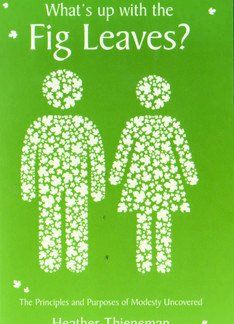This is a good book. The aim is not so much to catalogue a list of what is modest, but rather to examine biblically what is entailed in the concept of modesty. The underlying conviction of the author is that we need our hearts purified as well as our minds clarified.
She approves the definition of modesty by Kenneth Wuest: ‘An orderly and appropriate relationship between one’s clothing and one’s Christian character’.
If this sounds restrictive, the American author acknowledges that, in the USA, modesty has become a term relating mostly to clothing. This contrasts with its older usage, still current in British English: ‘humbleness, moderation, restriction’.
The author writes in a readable style and from a solidly Reformed perspective. She exegetes the relevant texts carefully. The Creation and the Fall are explicitly taught as the background to the goodness of modesty and the problem of immodesty.
Putting on your clothes every morning is unique to humans and testifies to our sinfulness and need of Christ. Evolution can’t explain why humans feel embarrassment at nakedness and animals don’t. Christianity, unlike religions, teaches that God loves bodies, and always will.
The book is written mostly for women: ‘modesty is content to be beautiful to one man’. It will also be useful to pastors and elders in churches where any rebuke about immodest dress leads to charges of legalism. Holiness is not legalism.
Modesty, we are taught, is an absolute, not defined by society but by God. Its provenance is not in feelings but objective reality. Modesty is not a ‘grey area’ or a ‘thing indifferent’. Moreover, it is not avoidance of ‘standing out’; it may even mean standing out by being the only modestly dressed person.
Three principles underlying the need for modesty are: it is wrong to lust; temptations to lust are often visual; it is wrong to tempt. Dressing modestly is not curtailment of one’s Christian liberty, because immodesty is sinful; no one is ‘free’ to be immodest! Liberty relates to what is innocent and harmless, not sinful or harmful.
There are some slight caveats. Are the desires for men to look at women, and women to be looked at by men, really ‘good’ (unchanged since Creation), as the author implies? Is there, for one with a new spiritual nature, such a thing as a ‘natural sin’?
However, these are not major issues in their context. There are good discussions about beauty, culture, modesty and the Christian. Altogether, this book is warmly recommended.
John Palmer
Leigh




